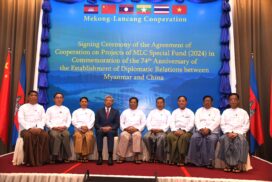The Ministry of Agriculture, Livestock and Irrigation have taken steps to boost farmers’ earnings by establishing agricultural and farming zones nationwide.
With announcing its plan on Monday, the ministry said it would take steps to facilitate the establishment of food processing industries and value-added units in the special zones with the aim of narrowing the poverty gaps between the urban and rural areas and creating job opportunities.
When it comes to drawing the master plan, sustainable availability of water with good irrigation system, the protection of farmland against flood, enforcing Good Agriculture Practices-GAPs, good farming practices, biosecurity for animals, the construction of sub-surface dykes to improve the groundwater table and the modernization of canals should be among the measures that the government should focus on simultaneously.
The new thinking has arisen to tackle the challenges concerning producing value-added products and finished food products that come from agriculture-led industrialization and animal farming in our country.
Food-based products from neighbouring countries are entering our domestic market, despite the abundance of rice, beans, corn, edible oil crops, vegetables, and fruits in Myanmar. Why? One reason is that although we are a food producer nation, we are weak in manufacturing finished food products.
We are confident that investing in the agriculture and livestock farming sector plays an essential role in poverty alleviation and would lift the living standard of farmers.
The development of agriculture and livestock farming-based special zones will help bring about the local breeders’ socio-economic development, market potentials for the livestock products and revenue for the country.
Myanmar has already set the goal of turning itself into an agro-based industrial country. We have huge swathes of vacant and fallow land, plenty of labour, and ready internal and external markets. Besides, 60 per cent of our domestic industries are involved in food-manufacturing. But, about 90 per cent of them are small and medium enterprises (SMEs).
Domestic food producers, especially SMEs, cannot guarantee their products’ safety, and the quality of their goods is much lower because they have less capital and lag in technology. They are also weak in packaging.
When it comes to establishing the special zones, we need to take into consideration the said points.
The time is ripe for transforming the country’s agricultural sector and livestock breeding sector by switching from a traditional system to mechanized farming and mass production of finished food products as part of efforts to boost the economy.













